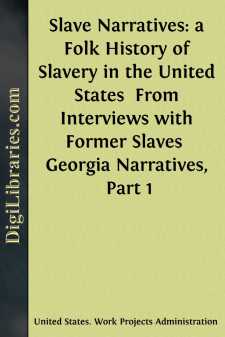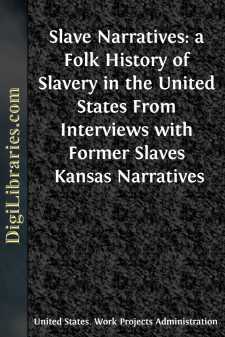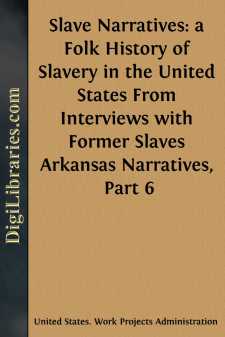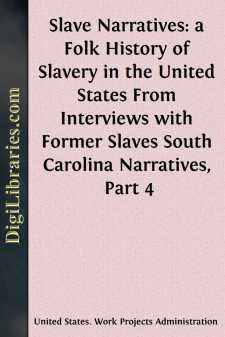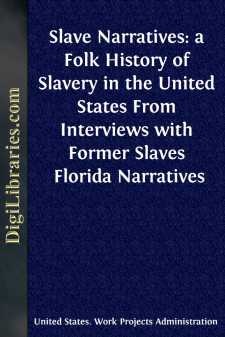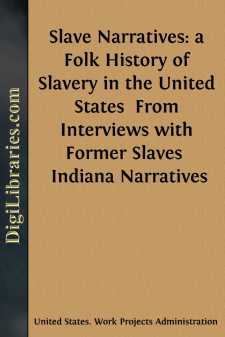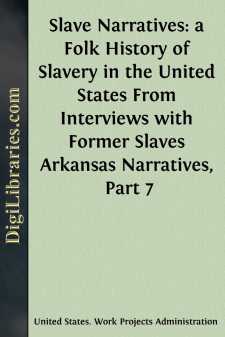Categories
- Antiques & Collectibles 13
- Architecture 36
- Art 48
- Bibles 22
- Biography & Autobiography 813
- Body, Mind & Spirit 142
- Business & Economics 28
- Children's Books 17
- Children's Fiction 14
- Computers 4
- Cooking 94
- Crafts & Hobbies 4
- Drama 346
- Education 46
- Family & Relationships 57
- Fiction 11829
- Games 19
- Gardening 17
- Health & Fitness 34
- History 1377
- House & Home 1
- Humor 147
- Juvenile Fiction 1873
- Juvenile Nonfiction 202
- Language Arts & Disciplines 88
- Law 16
- Literary Collections 686
- Literary Criticism 179
- Mathematics 13
- Medical 41
- Music 40
- Nature 179
- Non-Classifiable 1768
- Performing Arts 7
- Periodicals 1453
- Philosophy 64
- Photography 2
- Poetry 896
- Political Science 203
- Psychology 42
- Reference 154
- Religion 513
- Science 126
- Self-Help 84
- Social Science 81
- Sports & Recreation 34
- Study Aids 3
- Technology & Engineering 59
- Transportation 23
- Travel 463
- True Crime 29
Slave Narratives: a Folk History of Slavery in the United States From Interviews with Former Slaves Georgia Narratives, Part 1
Categories:
Description:
Excerpt
PLANTATION LIFE
RACHEL ADAMS, Age 78
300 Odd Street
Athens, Georgia
Written by:
Sadie B. Hornsby [HW: (White)]
Athens
Edited by:
Sarah H. Hall
Athens
and
John N. Booth
District Supervisor
Federal Writers' Project
Residencies 6 & 7
Augusta, Georgia
Rachel Adams' two-room, frame house is perched on the side of a steep hill where peach trees and bamboo form dense shade. Stalks of corn at the rear of the dwelling reach almost to the roof ridge and a portion of the front yard is enclosed for a chicken yard. Stepping gingerly around the amazing number of nondescript articles scattered about the small veranda, the visitor rapped several times on the front door, but received no response. A neighbor said the old woman might be found at her son's store, but she was finally located at the home of a daughter.
Rachel came to the front door with a sandwich of hoecake and cheese in one hand and a glass of water in the other. "Dis here's Rachel Adams," she declared. "Have a seat on de porch." Rachel is tall, thin, very black, and wears glasses. Her faded pink outing wrapper was partly covered by an apron made of a heavy meal sack. Tennis shoes, worn without hose, and a man's black hat completed her outfit.
Rachel began her story by saying: "Miss, dats been sich a long time back dat I has most forgot how things went. Anyhow I was borned in Putman County 'bout two miles from Eatonton, Georgia. My Ma and Pa was 'Melia and Iaaac Little and, far as I knows, dey was borned and bred in dat same county. Pa, he was sold away from Ma when I was still a baby. Ma's job was to weave all de cloth for de white folks. I have wore many a dress made out of de homespun what she wove. Dere was 17 of us chillun, and I can't 'member de names of but two of 'em now—dey was John and Sarah. John was Ma's onliest son; all de rest of de other 16 of us was gals.
"Us lived in mud-daubed log cabins what had old stack chimblies made out of sticks and mud. Our old home-made beds didn't have no slats or metal springs neither. Dey used stout cords for springs. De cloth what dey made the ticks of dem old hay mattresses and pillows out of was so coarse dat it scratched us little chillun most to death, it seemed lak to us dem days. I kin still feel dem old hay mattresses under me now. Evvy time I moved at night it sounded lak de wind blowin' through dem peach trees and bamboos 'round de front of de house whar I lives now.
"Grandma Anna was 115 years old when she died. She had done wore herself out in slavery time. Grandpa, he was sold off somewhar. Both of 'em was field hands.
"Potlicker and cornbread was fed to us chillun, out of big old wooden bowls. Two or three chillun et out of de same bowl. Grown folks had meat, greens, syrup, cornbread, 'taters and de lak. 'Possums! I should say so. Dey cotch plenty of 'em and atter dey was kilt ma would scald 'em and rub 'em in hot ashes and dat clean't 'em jus' as pretty and white. OO-o-o but dey was good. Lord, Yessum! Dey used to go fishin' and rabbit huntin' too. Us jus' fotched in game galore den, for it was de style dem days. Dere warn't no market meat in slavery days. Seemed lak to me in dem days dat ash-roasted 'taters and groundpeas was de best somepin t'eat what anybody could want. 'Course dey had a gyarden, and it had somepin of jus' about evvything what us knowed anything 'bout in de way of gyarden sass growin' in it....


